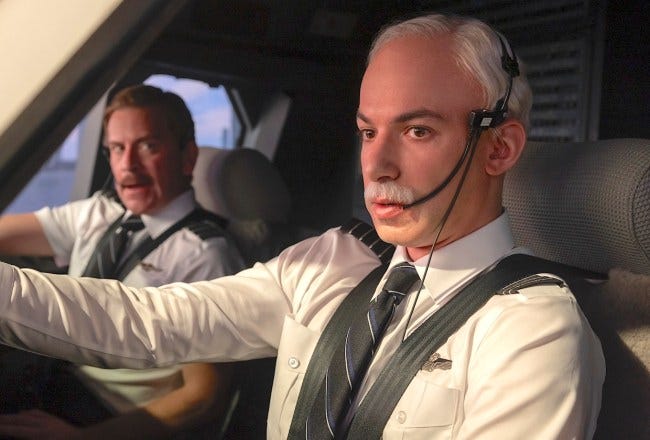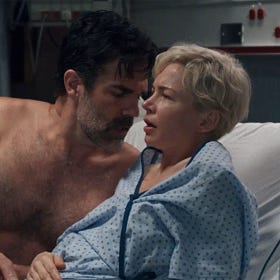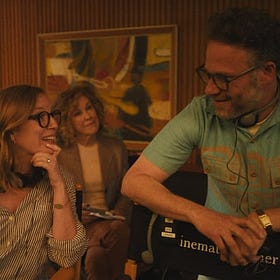The Rehearsal is simple. It’s a comedy series created by and starring Nathan Fielder, in which Nathan gets over-committed while seeking to assist others.
The Rehearsal is complicated. It’s a show in which Nathan Fielder is attempting to pull back the curtain on how television gets made, and thrusts us into a liminal netherworld in which the distinction between fact and fantasy is muddied beyond repair.
In this season of The Rehearsal, Fielder has developed an interest in plane crashes, and in the perils of poor communication between pilots and copilots. His re-creations of past aviation calamities document pilots who shut down real-time feedback or criticism from their copilots, thereby preventing any hope of rescue. (Curiously, the show has not yet referenced Malcolm Gladwell’s book Outliers, which also covers the same topic, and offers some of the same suggested remedies for improving airline safety.)
In “Pilot’s Code,” the third and most revealing episode yet of this season, Fielder notes that Captain Chesley Sullenberger, famous for landing a plane safely in the Hudson River, had notably asked his copilot for input as they prepared to crash-land. He wonders whether there might be wisdom to be found in Sullenberger’s story that could be shared with other pilots.
Nathan is, as usual, too much. It looks like he has purchased about 50 copies of Sullenberger’s memoir, and then proceeds to slice them into neat piles of pages separated by theme. He describes searching inside the book for themes as if it were the bible of some minor religion (Sullyism?), re-creating key moments from the pilot’s life by playing the pilot himself.
“As Sully, I wanted to talk about my feelings, but everything I knew was telling me I couldn’t.” Sully/Nathan watches as his father’s ashes are scattered, his face impassive but his eyes haunted by repressed emotion. Sully loses his father, and seems—in Fielder’s performance—to be grappling inarticulately with emotions he is not sure how to express.
And it is at that moment that something finally clicks. We are here in the world of airline pilots because pilots, like Fielder, are prevented from feeling, or from fully expressing their emotions.
As The Rehearsal explains, pilots must have a health waiver to fly, and any indication of mental instability—including a visit with a therapist—may be enough to permanently ground them.
Fielder’s Talmudic reading of Sullenberger’s memoir pays off with an unexpected insight: it is only after his father’s death, well into the book, that Sully starts to reference music repeatedly, paying tribute to songs like Sheryl Crow’s “Soak Up the Sun.” In one hilarious and heartfelt imagined scene, Sully/Fielder stands at an airport kiosk studying the packaging for an iPod, chatting with a store employee under a sign that reads “NEW INVENTION.”
“It fits 1,000 songs?” Sully wonders. “I don’t think I could even name five songs.” The surprisingly philosophical kiosk employee tells him, “There’s no medicine more powerful than music.” We see Sully gently lay his iPod and headphones flat on the security check, as if his heart was now contained within Steve Jobs’ miraculous music machine. Barred from accessing his own feelings or wrestling with them, Sully uploads his emotions into his iPod. We watch him in his undershirt in a soulless hotel room, leaning forward expectantly as he drags and drops a Tracy Chapman song into his MP3 player.
Let us stipulate that we do not know anything whatsoever about the real-life Nathan Fielder. For all I know, Nathan Fielder is emotionally open, generous, and the life of the party. But “Nathan Fielder”—his character on The Rehearsal, who appears to fit him like a second skin—lives in mortal terror of being forced to confront his feelings. He is buttoned-up, withholding, struck mute by the prospect of discussing his own inner world. He is, in short, A Man.
What is telling, though, is that The Rehearsal gives us numerous, repeated hints that there is, indeed, an inner world in there. In the emotionally overwhelming first-season finale, aspiring father Nathan breaks character—or does he? —sweeping up one of his on-screen “children,” who is genuinely confused about whether Nathan is his actual father, in his arms and telling him that he will always be his father, his eyes rimmed red with withheld tears. Is this acting, or is it an unexpected eruption of emotion?
Sully has been selected as the subject of Fielder’s amateur biopic not only because the anal-retentive comedian has dug into a thousand National Transportation Safety Board after-crash reports, but also because, wonderfully and unexpectedly, airline pilots are a precise match for Fielder’s own brand of emotional repression. In one weird but moving moment, Sully lingers outside a therapist’s office, watching as a male patient gives his therapist a farewell hug. The therapist then offers Sully a session (do therapists generally canvass for patients outside their offices?), and Sully looks longingly in the direction of his open door before reluctantly rejecting the offer. There is so much that Sully would say and cannot say, and try as he might, he simply cannot enter that door. (Insert joke here about how men would rather land their airplanes in the Hudson River than go to therapy.)
During that fateful flight, the plane’s engines are struck by birds and rendered inoperable. “Pilot’s Code” returns multiple times to the moment of Sully calmly informing air-traffic control that instead of landing at the airport, he will be landing the plane in the Hudson. Fielder can be robotic as an actor, and here that utter lack of emotion serves the character. Sully is able to be as good as he is at his job because he shuts out all feeling precisely when most of us would crumble from stress.
Sully is a peak example of Gary Cooper masculinity: strong, silent, indomitable. And at first, “Pilot’s Code” can be read as the emotional equivalent of all the American men marching around in camo and sticking Punisher decals on their trucks, borrowing valor from soldiers and first responders who face actual peril in order to justify their own casual cruelty or callousness. But Fielder’s oddball investigation circles back to the music.
Digging through both the black-box recording of the cockpit chatter and the discussion of music in Sully’s memoir, Fielder makes an unusual connection. The 23-second silent pause before the plane begins its descent into the Hudson matches—can you guess? Just kidding, you literally could never guess if I gave you a million lifetimes to come up with it—the exact length of the chorus of one of Sully’s favorite songs, Evanescence’s gloom-rock banger “Bring Me to Life.” “Is it possible,” Fielder wonders in voiceover. “that Evanescence taught Sully that it’s OK not to be perfect and ask for help just in time for his fateful flight?” And so we see Sully, preparing to land his plane under impossible circumstances, pop in his earbuds and listen to Evanescence sing “Wake me up inside/I can’t wake up inside/Call my name and save me from the dark/…Save me from the nothing I’ve become.”
Fielder is—I say this with so much love and affection—a limited actor. Playing a character like Sully is a real stretch for him. (No less than Tom Hanks took on the challenge in the conventional biopic made about the pilot.) He is not likely to ever win an Emmy for his acting. But Fielder crams an excess of unexpected emotion into this 23-second stretch. He squeezes his eyes shut, seeking to hoover up all the emotion in Amy Lee’s voice and let it propel him forward. Sully cannot talk through his feelings, cannot process them, cannot even acknowledge them, but in this moment of maximal crisis, in which the lives of hundreds of people depend on his skill and expertise, he momentarily retreats into a protective cocoon of art and emotion. Moreover, the song itself is a howl of a frozen spirit, in search of words to express the buried emotions slumbering inside the singer.
Without words to describe our existences, we are automatons living shadow existences. It is Nathan Fielder’s great accomplishment that he is able to so thoroughly embody this buried emotion without being able to express it in words.
The plane lands safely, Sully asks his copilot not to mention the whole listening-to-my-iPod-while-the-plane-is-crashing thing, and Fielder returns to the genuine pilots—at least we think they are—who’ve shared their experiences with him. “You’re like my therapist now,” one tells him, and there is an abiding sense that these mostly male pilots desperately need an outlet for their emotions, that they are crumbling into dust from the force of restraining their feelings. As with pilots, so with men; as with Chesley, so with Nathan. Fielder describes his Evanescence theory as “a hunch I have from living as him for so long.” He might be talking about the salt-and-pepper hair and the pilot’s wings, but he might also be referring to overlap of personalities, too.
In the final sequence, we see Sully again, standing once more outside the therapist’s office yearningly. But this time, he goes inside. I don’t know if the real-life Chesley Sullenberger ever was in therapy. But it is very telling to me that in Fielder’s retelling, the story does not end with the safe landing, but with the lingering question of how to wake yourself up inside.
Sully landed a jet full of passengers safely in the Hudson River, thereby justifying—just barely—a lifetime of emotional repression. What’s your excuse?
More Up-Close TV Analysis
How 'Dying for Sex' Gets Death and Sex So Right
Going behind the scenes of the astonishing new dramedy with a writer who brought her own cancer experiences to the series.
Thank You for Being a Friend
What does it mean to be a good friend? Americans appear not to know anymore. The surgeon general has declared an epidemic of loneliness. Fewer and fewer Americans say they have close friends, or report spending less time with friends on a regular basis









So good! This show is so wild that it can always use some analysis. Even for him, this episode was next-level.